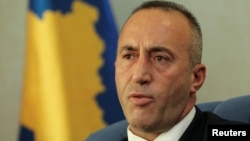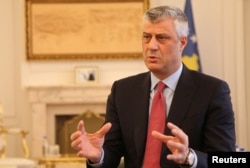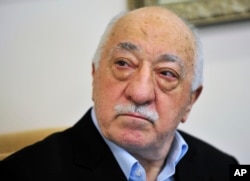Kosovo's prime minister said Tuesday that he was confounded by the Turkish president's angry reaction to Pristina's domestic probe into last week's arrest and deportation of six Turkish citizens with ties to schools linked to the Fethullah Gulen movement, which Ankara blames for a failed 2016 coup.
"One cannot just snatch people from Kosovo," Prime Minister Ramush Haradinaj said in an interview with VOA's Albanian service. "This was a sort of a theft of people from Kosovo."
It was on Saturday when Turkish President Recep Tayyip Erdogan said Haradinaj would "pay" for dismissing Kosovo's interior minister and intelligence chief for deporting the six people without his permission. On Sunday he again criticized the prime minister, calling it a "historic mistake to fire the intelligence agency head and interior minister who gave us members of the '[Gulen]' terrorist organization, [as] they only carried out their duties."
Haradinaj fired the two officials after launching a probe into the deportations that, he contended, violated Kosovo's "decision-making hierarchy."
"There is fogginess over the deportation," Haradinaj told VOA on Tuesday. "The quick revoking of residence permits and the secrecy in deportation, along with the fact I was not informed about it, constituted the basis for my decision to dismiss the minister of interior and the director of the Kosovo Intelligence Agency."
President's switch
Kosovo President Hashim Thaci initially expressed "disappointment at how relevant institutions" had failed to protect foreign citizens working in Kosovo, but later said the "Turkish citizens had committed crimes in Kosovo" that may have threatened "our entire national security."
Still, Haradinaj told VOA, the arrests, visa revocations and deportations —which all occurred in under three hours — failed to follow due process of law, and thereby constituted an extrajudicial act.
Although the KIA dossier indicated the six Turkish citizens had conducted "financial transactions and activities that ... could have brought risks to Kosovo," Haradinaj said, the rush to deport the subjects was a red flag for leaders in the tiny Balkan nation that is still eyeing EU accession protocol.
Because "this information was not internally processed in a serious manner" by the KIA or the interior ministry, Haradinaj said, he immediately triggered a probe.
The fate of Kosovo's intelligence chief remains unclear, since his dismissal requires signature approval by Thaci, who has said further "investigation needs to be conducted on the matter" before the dismissal can be finalized.
Diplomatic fallout
Asked whether he was concerned about diplomatic fallout over his protest of the extradition to Turkey, which is a primary financial backer of Kosovo and among the first to recognize its 2008 secession from Serbia, Haradinaj suggested the question was beside the point.
"Look, I do not personally know President Erdogan, but we are interested in a strategic partnership with Turkey at the international level and in getting [EU] recognition, and I do not want to prejudge anything," he said.
"Again, what is important is that in Kosovo, nobody can do our work on our behalf," he added before reiterating a statement he issued Monday while addressing an event marking the 550th anniversary of the death of the Albanian national hero, George Kastrioti, who for 25 years fought against the Ottoman invasion. "We'll do it ourselves. No one will have any power [over] decision-making in Kosovo's internal affairs."
EU spokeswoman Maja Kocijancic on Tuesday said "the arrest and subsequent deportation of six Turkish nationals legally residing in Kosovo raise questions about the respect of the due process of law."
"All actions of the local Kosovo institutions are bound by the full respect for the rule of law and promotion of universal respect for and observance of human rights and fundamental freedoms," Kocijancic said.
"As for Turkey, while we understand the need to bring the culprits of the coup attempt of 15 July to justice, any alleged wrongdoing or crime should be subject to due process and well established international norms when seeking extradition," she added. "As a European Union candidate country and a member of the Council of Europe, Turkey has subscribed to these principles."
U.S. view
A U.S. State Department official, speaking on background, echoed calls for due process and rule of law, adding that that the U.S. was "encouraged that Kosovo's state institutions have announced their determination to review this event and improve procedural safeguards to protect due process rights."
The State Department referred further questions to the governments of Kosovo and Turkey, with whom the U.S. maintains extradition treaties.
Kosovo, along with other Balkan countries such as Bosnia, Macedonia, Albania and Serbia, has been under pressure from Turkey to take action against schools funded by the Gulen organization.
Turkish firms run Kosovo's sole airport and electricity network and are building two highways worth around $2 billion.
Ankara accuses Gulen, a Muslim cleric based in the United States, of masterminding the July 15, 2016, coup attempt and has declared his movement a terrorist operation. Gulen denies any link to the attempted coup.
This story originated from VOA's Albanian service.






